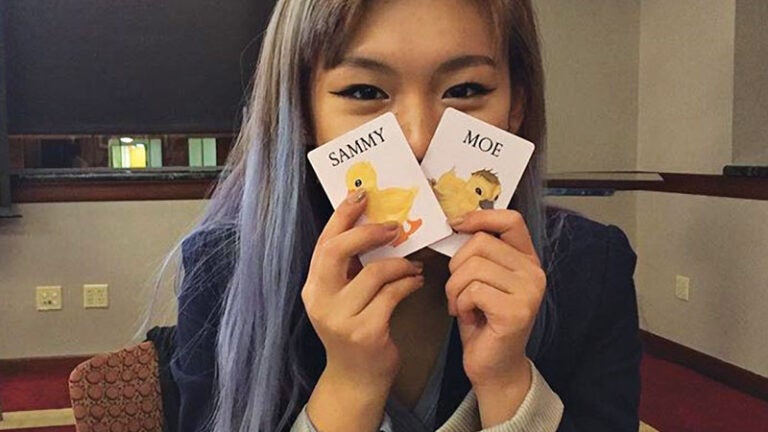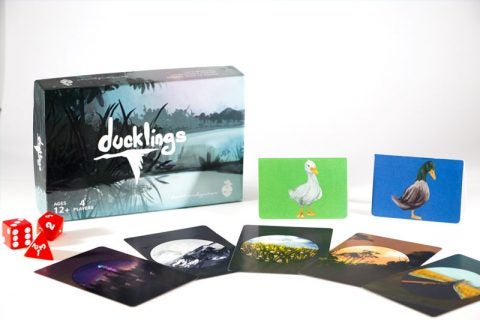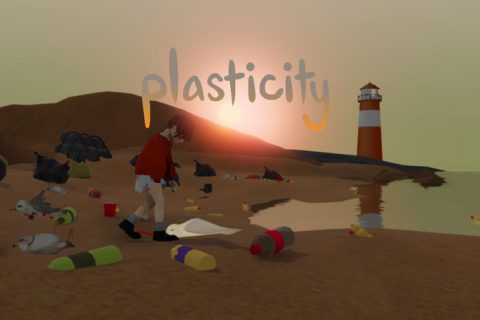
USC junior Aimee Zhang (Photo courtesy of Aimee Zhang)
A USC Student Designs Games With an Emotional Punch
A creative junior designs games for all different platforms that are both fun and heart-wrenching.
Grief isn’t the typical emotion you’d associate with a board game. But for USC game design students, it became the basis for a game that’s taken off among players worldwide.
The card-based game Ducklings asks users to confront moral dilemmas as they escort three baby ducks through harsh terrain, like the rainforest or desert. The perilous journey sometimes requires players to make tough choices, like whether to sacrifice themselves (virtually) to save the babies.
“Games haven’t explored emotions the way movies have — at least in the board games space,” said Zhang, who is studying interactive entertainment at the USC School of Cinematic Arts.
They polished the game in class, and then entered it in the USC New Venture Seed Competition, hosted by the Lloyd Greif Center for Entrepreneurial Studies. As contest semi-finalists, they were invited to classes at the USC Marshall School of Business to study marketing, pitching and branding. Spurred by social media buzz, they posted the game on Kickstarter, hoping to raise $8,000. They made $14,000 their first day. At the time of writing, they’ve reached nearly $30,000 and have players spanning the globe, from the United Kingdom to Hong Kong.
“I never made a board game before this,” said Zhang, a junior. “I didn’t actually play my first game until I came to USC.”
Moreover, before arriving at USC, Zhang never imagined she’d be a game designer.
From animation to USC game design
“Growing up, I wanted to be a math teacher,” she said. “I loved calculus.” But designing experimental games in high school at the Orange County School of the Arts sent her a different direction. She interned at the University of California, Irvine, where she worked on Sankofa, an adventure game set in 18th-century Ghana. It taught her that games have the power to create deep emotional experiences for players.
“You know how they say, ‘wear the shoes of another person’? Games actually give you the shoes — and that’s really exciting to me,” Zhang said.
She applied to USC with animation as her first choice, but School of Cinematic Arts faculty saw her portfolio and knew her true potential might be on a different path. It had “games” written all over it.

“I love making games more than anything, and probably wouldn’t have discovered that until years later if things had been different,” she said.
Today she aims to work across media.
“My goal in college is to make a game that I’m proud of for all popular platforms,” she said. Virtual reality, console, mobile, toys and board games? She has ticked several off her list already. Now she’s generating social media interest for Octobo, a Kickstarter-funded smart plush toy. She also creates art and design work for the virtual and augmented reality games company Tender Claws.
Fun and games, and raising awareness
She is nurturing a laptop-based concept called Plasticity, too. “The game is about a young girl exploring and deciding the future of her post-oil, plastic-ridden world,” Zhang said. Similar to Ducklings, she wants it to tap into a player’s emotions. Users are challenged with moral choices that can help or harm the environment.
“At this huge climax, when you return 10 years later, you see how your choices impacted the earth,” she said. The game shows the ripple effect of good or bad behavior, illustrating how singular actions can inspire other people. “If they see you polluting, they start polluting,” she said.
Plasticity was one of six projects chosen by faculty for an advanced USC Games capstone project. She leads about 20 students to create the game in partnership with the USC Dornsife College of Letters, Arts and Sciences. It will become part of environmental studies courses. She also hopes to get tips from USC Dornsife students about the scientific side of things that pop up in her game, like red tide and algae blooms.

Because it can be played on laptops — which are far more commonplace than special game consoles or gear like headsets — it has the capacity to reach a lot of players. “I would like as many people to play this game as possible,” she said. “It’s a really important topic. We dump 8 billion tons of plastic in the ocean each year.”
Her love for gaming pushed her to work nearly 75 hours a week, between juggling her personal projects and part-time work for game companies and products. She has decided to cut back, but she is not slowing down—not when she has found her passion.
“When I got into USC and I started learning here, I couldn’t stop,” she said. Spoken like a true game lover.



